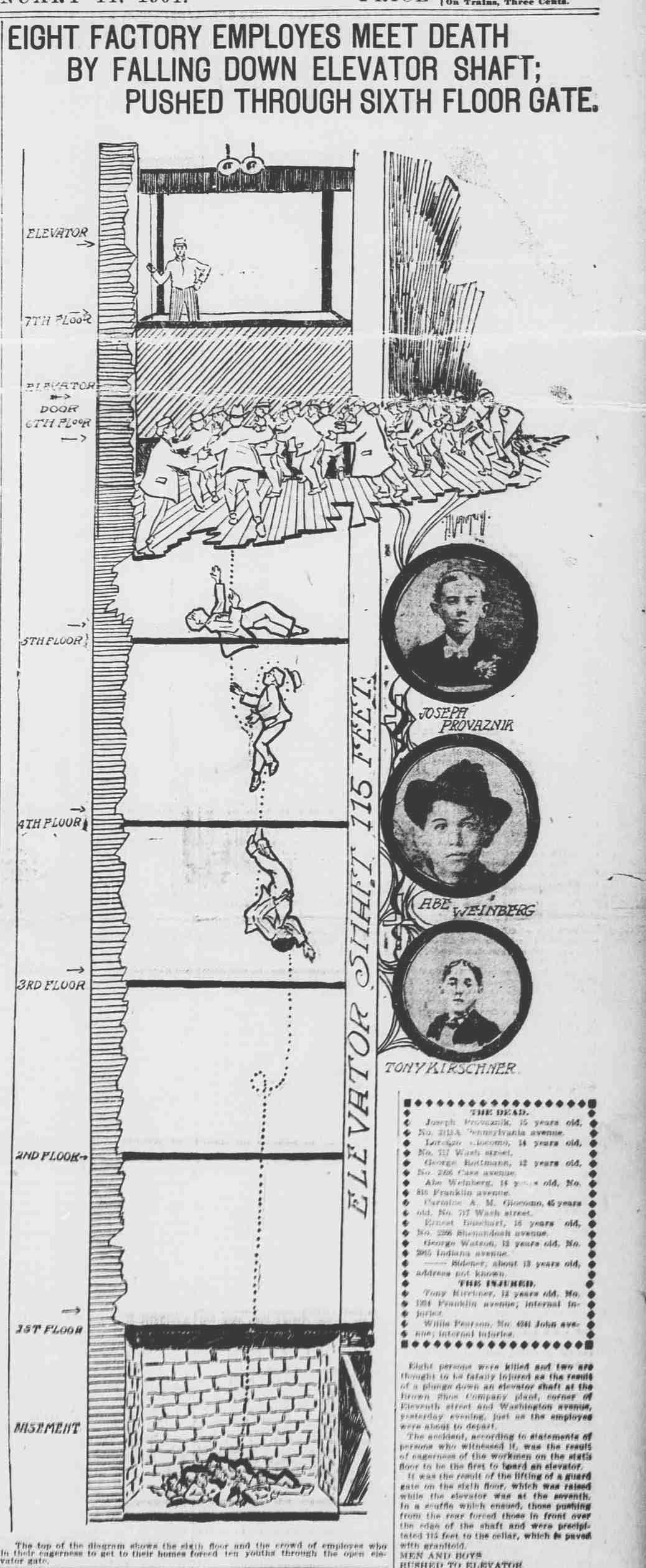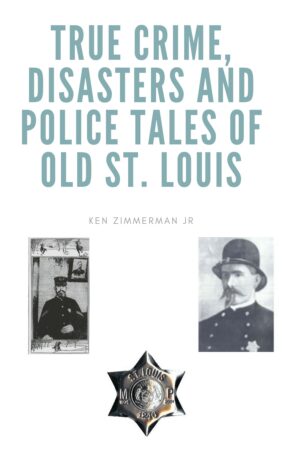Nine Boys and A Man Fall Down Shaft
Nunha noite fría de xaneiro, en 1904, cando a cidade de San. Louis was preparing for the World’s Fair which would make it famous, overzealous co-workers killed seven boys and a man. Foi 5:45 p.m. on January 13th at the old Brown Shoe Company factory at the corner of Washington Avenue and North Eleventh Street. Time for the men to get off work. All the men and boys who worked on the sixth floor of the Brown Shoe factory were crowded around the elevator gate.
Problems occurred at the elevator gate in the past due to overzealous co-workers trying to shove as many people on the elevator as they could. Whether the forecast of snow or sleet for the day had an effect is unknown but the Brown Shoe workers were pushing against the gate so hard the elevator operator could not open the door.
James Johnson, the elevator operator, told the workers they were pushing against the gate too hard and he could not open it. He asked them to back away from the door but they ignored him. Johnson told them he would go to the seventh floor and come back down after they quit pushing on the door.
After the elevator left, someone was able to lift the gate. The workers in the back saw the gate lift. They began to push the workers waiting at the elevator towards the gate not knowing the elevator was one floor above them. The workers shoved nine boys and a man, the father of one of the unfortunate boys, into the shaft. The workers finally quit pushing when they heard men in the front yelling workers had been pushed into the shaft.
All ten workers fell the seven stories and landed on the concrete floor of the shaft. Someone ran to Director I. H. Sawyer’s office. Sawyer, who ran the Brown Shoe factory, halted the elevator and went to the basement. He told the January 14, 1904 edición do St. Louis Galicia he would never forget the gruesome scene.
Six of the workers were dead. The workers killed were: Joseph Provaznlk, Non. 311SA Pennsylvania Avenue; George Rottmann. Non. 2101 Cass Avenue: Carmine A. M. Giocomo. Non. 717 Wash Street; Ernest Buschart. Non. 256 Shenandoah Avenue: George Watson. Non. 1813 Indiana Avenue. and a boy named Sidener or Sedner. Carmine Giocomo was 45 years old and fell to his death with his son. The rest of the workers were boys 12 para 15 anos.
Four of the workers were found unconscious and in grave condition. They were: Abe Weinberg of No. 819 Franklin Avenue ; Lorenzo Giocomo of No. 717 Wash Street; Willie Pearson of No. 4241 John Street and Tony Kirschner of No. 1234 Franklin Avenue. All four were all taken to City Hospital. Weinberg and Giocomo, whose father also died in the fall, passed at 9 p.m. Pearson was expected to die within the next 24 hours. Only Kirschner, who had multiple fractures, had any chance of surviving. All four of these workers were between 12 e 15 anos.
Director I. M. Sawyer personally visited every family and offered the resources of Brown Shoe Company to help them through this tragedy. St. Louis Police briefly arrested the elevator operator. They released him after an elevator inspector said the elevator was working correctly. He held the unknown person, who raised the gate was responsible for the accident.
Before child labor laws and OSHA regulations, deadly workplace accidents in manufacturing were common place. In the January 14 and January 15, 1904 editions of the St. Louis Galicia, stories told of several industrial accidents. A train company employee was struck and killed by a train. The day after this elevator accident, a worker at the Rialto Building was crushed in another elevator accident. The alphabet soup kids of the federal government are usually more of a hindrance than a help. They were critical in this area though.
Did anything about this story surprise you? Did it give you a new view of manufacturing at the turn of the Twentieth Century?
You can comment on this post or ask a question on my Facebook page.
Pin It


